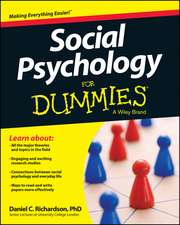Evolutionary Psychology: Alternative Approaches
Editat de Steven J. Scher, Frederick Rauscheren Limba Engleză Hardback – 30 noi 2002
| Toate formatele și edițiile | Preț | Express |
|---|---|---|
| Paperback (1) | 640.06 lei 6-8 săpt. | |
| Springer Us – 31 oct 2012 | 640.06 lei 6-8 săpt. | |
| Hardback (1) | 647.08 lei 6-8 săpt. | |
| Springer Us – 30 noi 2002 | 647.08 lei 6-8 săpt. |
Preț: 647.08 lei
Preț vechi: 761.27 lei
-15% Nou
Puncte Express: 971
Preț estimativ în valută:
123.81€ • 129.29$ • 102.24£
123.81€ • 129.29$ • 102.24£
Carte tipărită la comandă
Livrare economică 15-29 aprilie
Preluare comenzi: 021 569.72.76
Specificații
ISBN-13: 9781402072796
ISBN-10: 1402072791
Pagini: 288
Ilustrații: XVIII, 265 p.
Dimensiuni: 155 x 235 x 21 mm
Greutate: 0.6 kg
Ediția:2003
Editura: Springer Us
Colecția Springer
Locul publicării:New York, NY, United States
ISBN-10: 1402072791
Pagini: 288
Ilustrații: XVIII, 265 p.
Dimensiuni: 155 x 235 x 21 mm
Greutate: 0.6 kg
Ediția:2003
Editura: Springer Us
Colecția Springer
Locul publicării:New York, NY, United States
Public țintă
ResearchCuprins
Nature Read in Truth or Flaw: Locating Alternaties in Evolutionary Psychology.- The Evaluation of Competing Approaches within Human Evolutionary Psychology.- Evolution, Morality, and Human Potential.- Repeated Assembly: Prospects for Saying What We Mean.- Human Triangles: Genes, Sex and Economics in Human Evolution.- The Optimal Number of Fathers: Evolution, Demography, and History in the Shaping of Female Mate Preferences.- Dancing in the Dark: Evolutionary Psychology and the Argument from Design.- Adaptationism and Psychological Explanation.- Toward a Developmental Evolutionary Psychology: Genes, Development, and the Evolution of Cognitive Architecture.- Modules, Brain Parts, and Evolutionary Psychology.- Evolutionary Psychology and the Information-Processing Model of Cognition.- Evolutionary Psychology and Artificial Life.
Recenzii
"[...]a welcome volume for those of us who have been concerned that evolutionary theorizing in human psychology has been too narrowly defined [...] This is a must reading for anyone interested in applying evolutionary approaches to the study of human social behavior."
(Marilynn B. Brewer, Ph.D., Ohio State Regents Professor of Social Psychology, Ohio State University)
"Scher & Rauscher are to be commended for taking the nascent field of evolutionary psychology to its next level of maturity. Between these covers are essays that challenge some of the more entrenched theoretical assumptions of evolutionary psychology while, at the same time, advancing new methods and ideas for examining the mind from an evolutionary perspective."
(Lawrence Shapiro, Dept. of Philosophy, University of Wisconsin, Madison)
"The field of evolutionary psychology is, as always, in ferment; this volume [...] takes a broad and thoughtful view of the issues. It helps clarify some of them and also raises provocative new themes that will be debated in the years to come."
(Gene Robinson, Dept. of Entomology/Director, Neuroscience Program, University of Illinois at Urbana-Champaign)
"This volume is both eminently readable and timely [...] it focuses on the breadth of evolutionary views, emphasizing the necessary components of the evolutionary approach with the flexibility of the ideas possible. No one who cares about the development of evolutionary psychology can go forward without knowing the ideas expressed here."
(Chris Crandall, Dept. of Psychology, University of Kansas)
(Marilynn B. Brewer, Ph.D., Ohio State Regents Professor of Social Psychology, Ohio State University)
"Scher & Rauscher are to be commended for taking the nascent field of evolutionary psychology to its next level of maturity. Between these covers are essays that challenge some of the more entrenched theoretical assumptions of evolutionary psychology while, at the same time, advancing new methods and ideas for examining the mind from an evolutionary perspective."
(Lawrence Shapiro, Dept. of Philosophy, University of Wisconsin, Madison)
"The field of evolutionary psychology is, as always, in ferment; this volume [...] takes a broad and thoughtful view of the issues. It helps clarify some of them and also raises provocative new themes that will be debated in the years to come."
(Gene Robinson, Dept. of Entomology/Director, Neuroscience Program, University of Illinois at Urbana-Champaign)
"This volume is both eminently readable and timely [...] it focuses on the breadth of evolutionary views, emphasizing the necessary components of the evolutionary approach with the flexibility of the ideas possible. No one who cares about the development of evolutionary psychology can go forward without knowing the ideas expressed here."
(Chris Crandall, Dept. of Psychology, University of Kansas)












